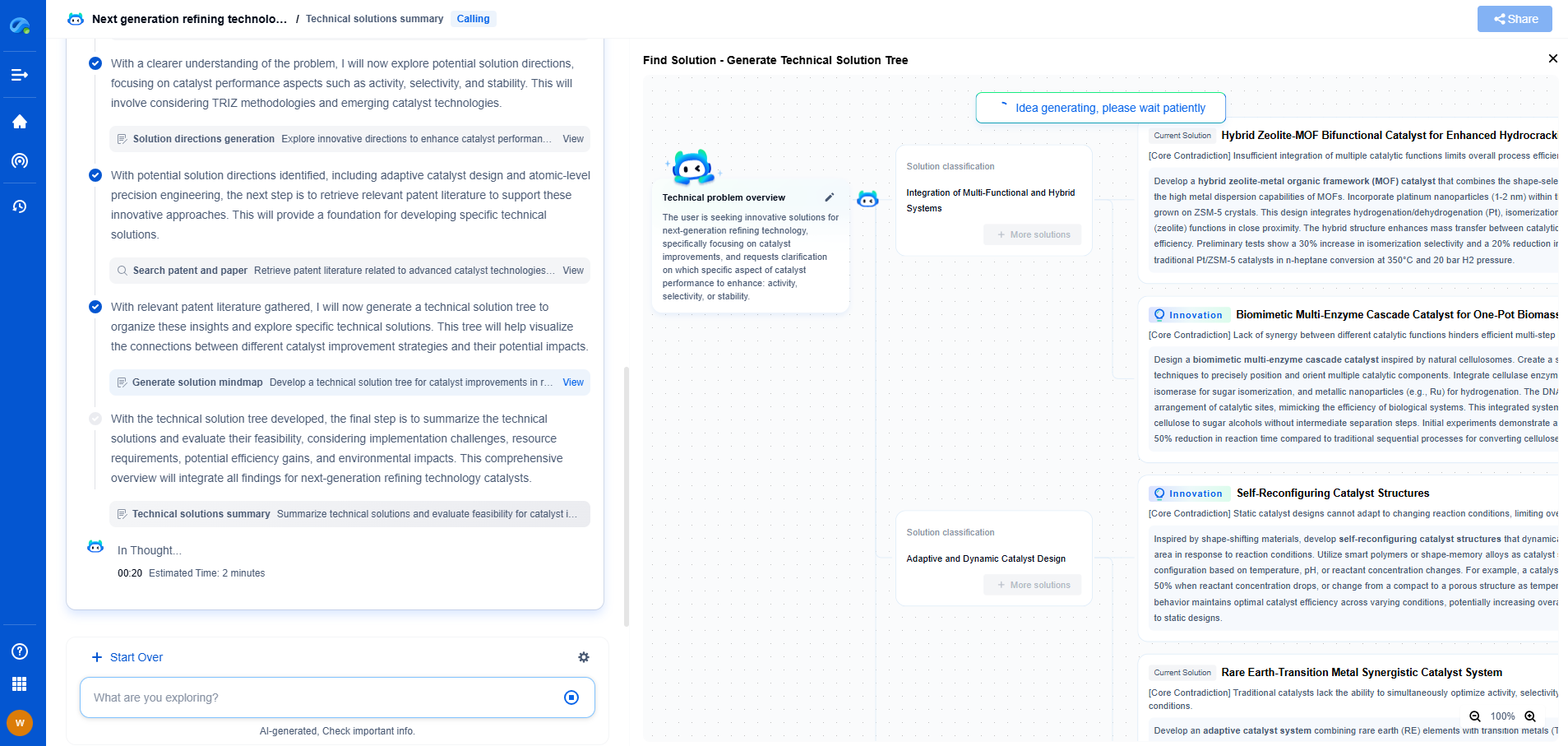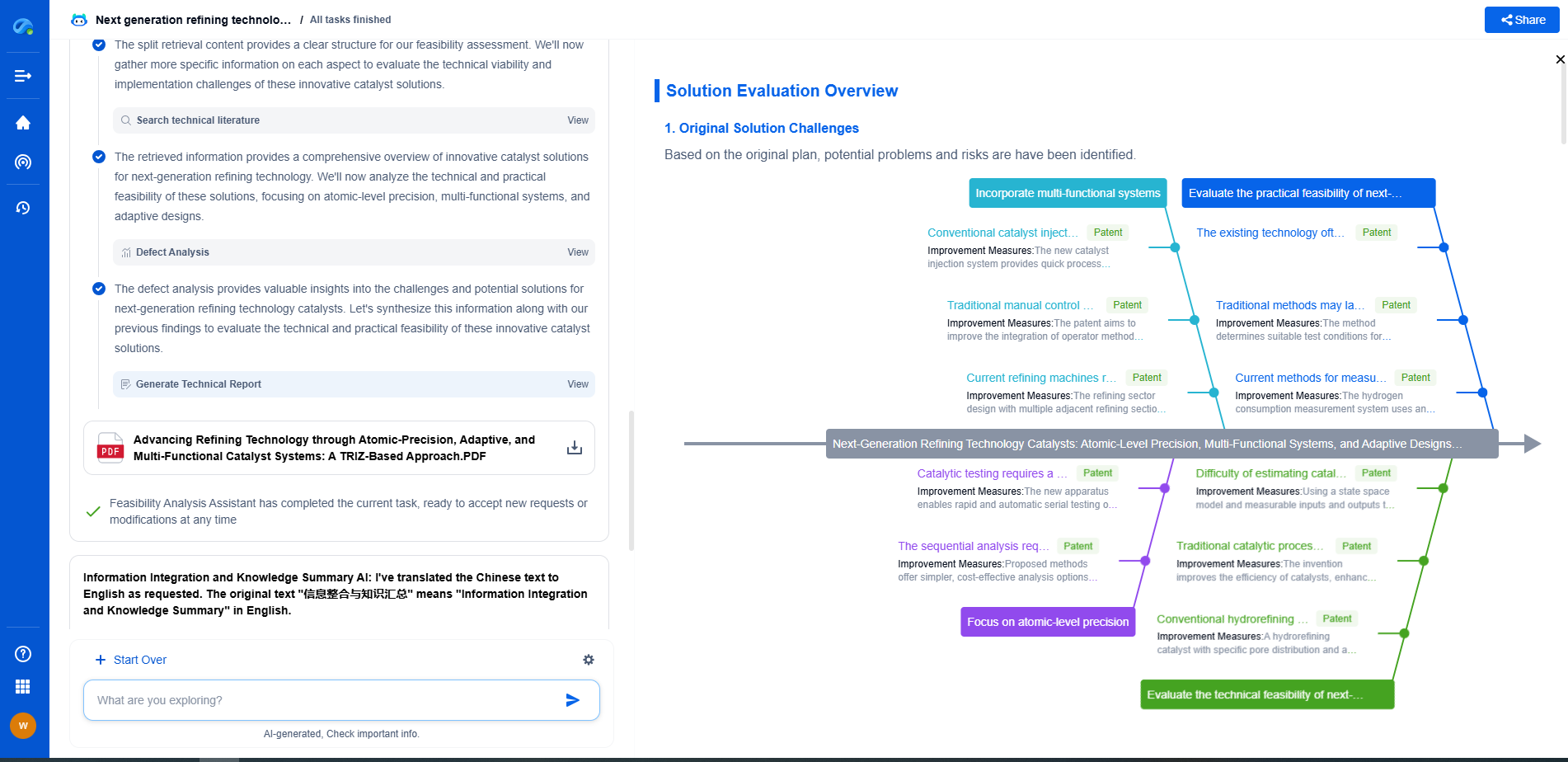Top Manufacturers of Automotive Fuel Cell Systems
JUN 20, 2025 |
As the global automotive industry shifts towards more sustainable and environmentally friendly solutions, fuel cell technology has emerged as a promising alternative to conventional internal combustion engines. Fuel cells, which generate electricity through the chemical reaction between hydrogen and oxygen, offer a clean and efficient power source for vehicles. As this technology continues to gain traction, several manufacturers have positioned themselves at the forefront of the automotive fuel cell system market. In this blog, we will explore some of the top manufacturers leading the way in fuel cell innovation.
Toyota: Pioneering Hydrogen Technology
Toyota has long been a trailblazer in the automotive industry, particularly in the development of hybrid and alternative fuel vehicles. With the launch of the Toyota Mirai, one of the first hydrogen fuel cell vehicles available to consumers, Toyota solidified its commitment to hydrogen technology. The company has invested heavily in research and development to improve the efficiency and affordability of fuel cell systems. Toyota's focus on building a comprehensive hydrogen infrastructure demonstrates its dedication to making fuel cell vehicles a mainstream solution for clean transportation.
Hyundai: Leading the Charge in Commercial Applications
Hyundai has aggressively pursued fuel cell technology, not only for passenger vehicles but also for commercial applications. The Hyundai NEXO, a hydrogen-powered SUV, showcases the company's expertise in this area. Moreover, Hyundai has been actively collaborating with various global partners to develop fuel cell systems for trucks and buses. By positioning itself as a leader in both consumer and commercial fuel cell vehicles, Hyundai is playing a significant role in expanding the application of this sustainable technology.
Honda: Innovating for the Mass Market
Honda has been a significant player in the fuel cell market with its Clarity Fuel Cell vehicle. The company is focused on making fuel cell technology accessible to a broader audience by reducing costs and enhancing performance. Honda's strategy includes partnerships with other automakers and investments in hydrogen refueling infrastructure to support the growth of fuel cell vehicles. Their commitment to innovation and collaboration illustrates Honda's ambition to become a key player in the clean energy future.
Ballard Power Systems: Powering Commercial and Heavy-Duty Sectors
Ballard Power Systems is a leader in the development of fuel cell technology for heavy-duty and commercial applications. The company is renowned for its PEM (Proton Exchange Membrane) fuel cell technology, which is utilized in a variety of applications, including buses, trucks, trains, and marine vessels. Ballard's focus on the heavy-duty sector allows it to address specific needs in industries where fuel cell technology can significantly reduce emissions and increase efficiency.
Plug Power: Building a Green Hydrogen Ecosystem
Plug Power has made significant strides in the development of hydrogen fuel cells, particularly for material handling and logistics applications. The company's GenDrive fuel cells are widely used in forklifts and warehouse operations, providing an efficient and clean alternative to conventional battery systems. Plug Power's vision extends beyond just the development of fuel cells; it aims to establish a complete green hydrogen ecosystem, including production, storage, and distribution of hydrogen fuel.
Nikola Corporation: Revolutionizing Trucking with Fuel Cells
Nikola Corporation is an emerging player in the fuel cell market, focusing on revolutionizing the trucking industry with hydrogen-powered semi-trucks. The company has garnered attention with its ambitious plans to develop long-range, zero-emission trucks that rely on hydrogen fuel cell technology. By targeting the heavy-duty transportation sector, Nikola aims to provide sustainable solutions for one of the largest contributors to transportation emissions.
Conclusion: The Road Ahead for Fuel Cell Vehicles
The advancement of automotive fuel cell systems is a crucial step towards achieving a more sustainable transportation future. As leading manufacturers continue to innovate and invest in hydrogen technology, the accessibility and adoption of fuel cell vehicles are expected to increase. With the combined efforts of industry leaders like Toyota, Hyundai, Honda, Ballard Power Systems, Plug Power, and Nikola Corporation, the road ahead for fuel cell vehicles looks promising. These companies are not only shaping the future of clean transportation but also contributing to the global effort to reduce carbon emissions and combat climate change.
Accelerate Breakthroughs in Fuel Cell and Battery Innovation—with the Power of AI
From solid-state battery breakthroughs to high-efficiency hydrogen fuel cells, keeping pace with fast-evolving chemistries, global patent landscapes, and emerging application pathways is an ever-growing challenge for R&D and IP professionals.
Patsnap Eureka, our intelligent AI assistant built for R&D professionals in high-tech sectors, empowers you with real-time expert-level analysis, technology roadmap exploration, and strategic mapping of core patents—all within a seamless, user-friendly interface.
Whether you're optimizing cathode formulations, evaluating electrolyte stability, or navigating the crowded patent space around battery pack design, Eureka empowers you to move faster and with greater confidence.
Start your journey with Patsnap Eureka today—streamline your research, enhance decision-making, and power the future of energy with AI-driven clarity.
- R&D
- Intellectual Property
- Life Sciences
- Materials
- Tech Scout
- Unparalleled Data Quality
- Higher Quality Content
- 60% Fewer Hallucinations
Browse by: Latest US Patents, China's latest patents, Technical Efficacy Thesaurus, Application Domain, Technology Topic, Popular Technical Reports.
© 2025 PatSnap. All rights reserved.Legal|Privacy policy|Modern Slavery Act Transparency Statement|Sitemap|About US| Contact US: help@patsnap.com

